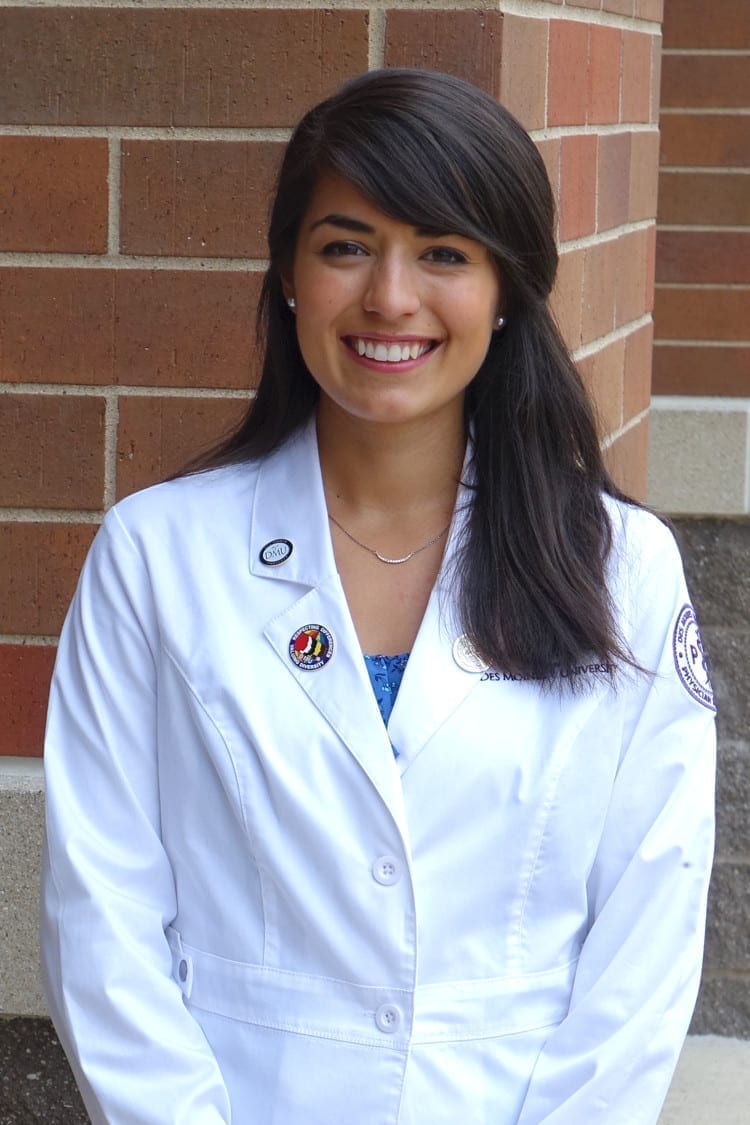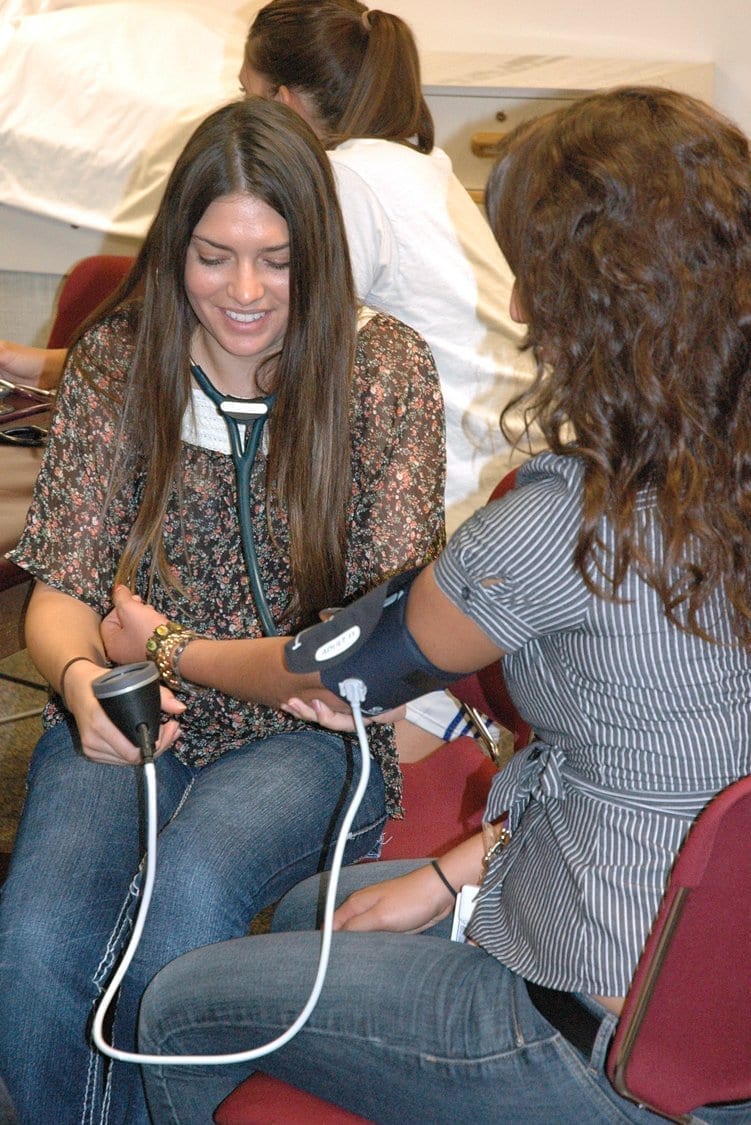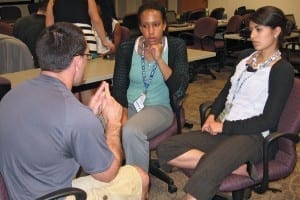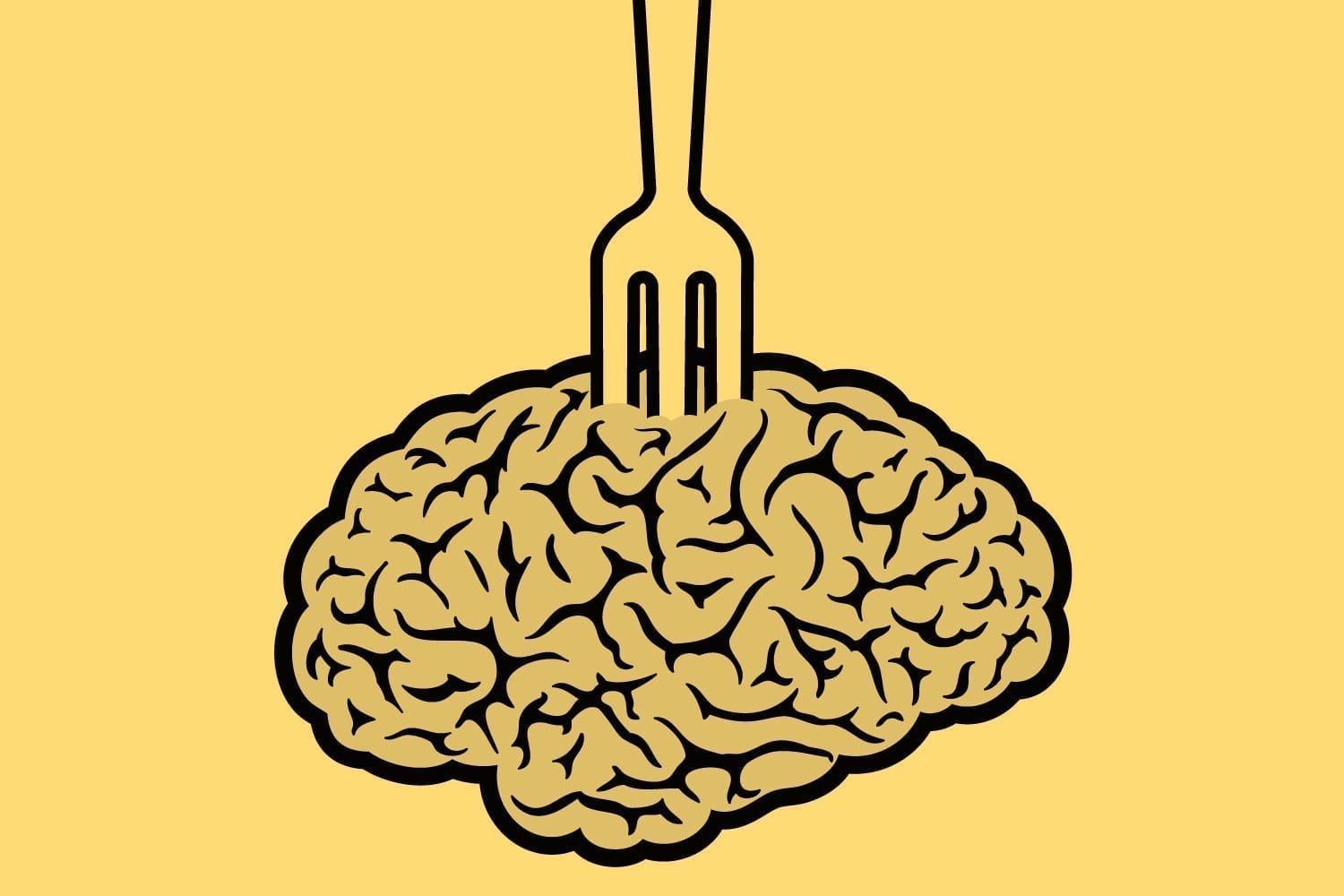After getting a taste of Des Moines University for three weeks one summer, these students returned to campus to complete their main courses.
Des Moines University hosts hundreds of prospective students year-round. From Discover DMU to program previews to traditional campus visits, there are numerous opportunities for students to explore the University. But it’s hard to get a feel for a school in a single day.
In 2010, DMU created Health Professions Advanced Summer Scholars (Health P.A.S.S.) to provide promising undergrads with an in-depth experience of life as a DMU student. For three weeks each summer, 12 lucky students get to feast their minds on all of DMU’s degree offerings — attending lectures, participating in hands-on labs, performing research and shadowing providers in the DMU Clinic. It’s as close as you can get to medical school without actually enrolling.
“Health P.A.S.S. was created as a way for DMU to provide an opportunity for students from backgrounds under-represented in medicine to learn more about our programs and gain an advantage as future applicants to health professions graduate programs,” says Katie Pearce, assistant director of admissions. “Students participate in a variety of activities while they are on campus. We introduce them to our programs through talks with program directors and deans. They receive interprofessional education, participate in labs and complete the Diversity and Health Series to learn about the social determinants of health.”
They also get plenty of feedback on how to prepare for grad school. Participants are paired with an admissions adviser who provides guidance in writing their personal statement and tips to strengthen their applications. DMU students serve as mentors, sharing their own successes and failures and answering questions about the University, the community and their degree program.
Health P.A.S.S. has proven to be a major showcase for the University, attracting a diverse group of students who never would have otherwise considered coming to Des Moines. Of the 65 students who have completed the program over the past six years, nine came back to DMU for graduate school. Several others are in the current application cycle or have a year or two left before they start the process.
Each returning student has his or her own reasons for coming back for a second helping of DMU, but their motivations share a common theme: They couldn’t picture going anywhere else.
Finding a home away from home

Brooke Borla had never been as far east. She grew up in Portland, OR, and stayed close to home in college, heading five hours northeast to attend Whitworth College in Spokane, WA. On the guidance of her academic adviser, she traveled halfway across the country to explore her interests in science and medicine in Health P.A.S.S.
“Ever since high school, I had an interest in medicine. I didn’t know exactly where I fit into all of that,” says Borla, PA’16. “My adviser happened to meet someone on a plane who worked for DMU. I was really excited to travel and meet new people and hear their motivations for going into health care.”
“As soon as I came back, I was like, ‘Yes, this is the place.’ I cancelled my other interviews and decided I was going to come back.”
Through her volunteer work at a local hospital system, Borla saw how different health professionals interacted and liked the role of the physician assistant. In Health P.A.S.S., she shadowed a variety of clinicians in the Des Moines University Clinic, including PAs. It reinforced her decision to pursue the career.
“I interviewed at one other school before I came here. As soon as I came back, I was like, ‘Yes, this is the place.’ I cancelled my other interviews and decided I was going to come back,” she says. “It just fit. I immediately felt at home, which meant a lot coming so far from home. I felt the faculty and clinicians were genuinely interested and invested in the students. And the students were passionate not only about health care but also about serving the community.
“[Health P.A.S.S.] is a great program. It allows people to see what opportunities are out there and meet a lot of the faculty here,” Borla adds. “They were all very down to earth, and you could tell they really cared about the students. I don’t know that I would have otherwise thought about coming to the Midwest or Des Moines.”

That’s a sentiment echoed by Borla’s friend and fellow Health P.A.S.S. alumna, Karina Allen de Oliveira. “There is so much more to do in Des Moines than many people realize. People couldn’t believe I wanted to move to Iowa, but there is actually a lot more to do here than there was at home,” says the Colorado Springs native.
Borla and Allen de Oliveira weren’t in Health P.A.S.S. at the same time, but the DMU admissions office introduced them when they both enrolled in the Physician Assistant Class of 2016. They connected before arriving on campus and became fast friends, bonded by their shared experiences and interests.
Like Borla, Allen de Oliveira was venturing far out of her comfort zone. She had never lived outside of Colorado Springs, where she was born and raised and attended college. Health P.A.S.S. made her comfortable with both the University and the city. After a day of lectures and labs at DMU, there were always fun excursions to Des Moines’ best restaurants, events and attractions.
While the city of Des Moines made a strong case — Allen de Oliveira loves the many biking and running trails — it was the allure of DMU that sealed the deal. “After Health P.A.S.S., I knew that I wanted to go to school at DMU. I actually did not apply anywhere else. The staff and faculty were friendly and helpful, and I could tell that they want the students to succeed.
“The facilities at DMU, such as the anatomy lab, surgery lab, simulation lab and SPAL, attracted me to the program,” she adds. “After using those facilities over the last year, I found out how important they really are. They provide the skills necessary for rotations and practice.”
Pursuing a lifelong dream

Whitney Vuong’s parents emigrated from Vietnam with $25 and dreams of a better life. America offered a better education for her brother and more advanced medical care for her father, who had been paralyzed by meningitis. They made a home in Chicago, where other family members had settled.
Born four years after her parents came to this country, Vuong faced adversity from the start. Her mother worked 12-hour days at several jobs to make rent, feed the family and pay mounting medical bills. Her handicapped father suffered from seizures, was prone to angry temper tantrums and had a speech impediment, making it impossible for him to hold a steady job. Through the help of physical therapists at the University of Illinois Hospital in Chicago, he began to walk again. Eventually, his seizures were under control as well. Seeing the effect medicine had on her father’s condition ignited Vuong’s desire to become a doctor.
“The very first time I decided to pursue medicine was in sixth grade. I wanted to become a physician because of the positive impact that the physicians had on my father and my family,” says Vuong, now a second-year osteopathic medical student. “To this day my mom still brings up what I said to her back then. I told her that I was never going to get married and would become a doctor who traveled the world helping people.”
Each returning student has his or her own reasons for coming back for a second helping of DMU, but their motivations share a common theme: They couldn’t picture going anywhere else.
This lifelong dream drove Vuong to shadow numerous physicians and volunteer more than 500 hours at hospitals. But it wasn’t until enrolling in Health P.A.S.S. that she found her calling: osteopathic medicine.
“Health P.A.S.S. made a large impact on my career choice. I know only a select few get to participate in the program, and I am forever grateful that I was chosen,” she says. “It allowed me to step in the shoes of a medical student to witness the rigorous education and training that it takes to become a physician. I was exposed to a different branch of medicine. After Health P.A.S.S., I decided to pursue osteopathic medicine wholeheartedly.”
The program helped Vuong solidify her career path, but the welcoming atmosphere and kind students and faculty at the University brought her back.
“What makes DMU so special is the people. The atmosphere that I experienced during Health P.A.S.S. is the same as the one that I have experienced in the year that I have been at DMU,” says Vuong. “Unlike other medical schools, the atmosphere is not cutthroat. There is more of a cooperative and collaborative spirit here. And I believe that this is more representative of health care, where teamwork plays a very important role.”
Discovering a whole new world

Like many students her age, Chelsea Clayton had no idea what she wanted to do after college or even what careers were out there. She started as an education major and switched to biology after a few semesters. There she found a couple of great professors who showed her the opportunities available in health care.
“I hadn’t even heard of DMU until Health P.A.S.S.! One of my professors talked to me about it and wrote my recommendation letter,” says the second-year student in DMU’s master of public health (M.P.H.) program. “I didn’t really know what I wanted to go into, so it was really interesting to see all the different programs.”
Clayton came into Health P.A.S.S. curious but directionless. The program introduced her to public health and health care administration — two areas she knew nothing about. Observing DMU clinicians sparked an interest in physical therapy. Clayton left with a load of new knowledge and a clearer picture of her future. Back at college, she joined community-focused public health groups, shadowed local physical therapists and went on a global health trip to Costa Rica.
“I never thought about moving to Des Moines, but when I got into the M.P.H. program I wanted to come to DMU because I loved it so much,” she says. “I like the feel of it. I came from small schools, so it was the same feeling I got from high school and undergrad.”
Until last fall, Clayton had never left the bubble of her hometown. She grew up in Early, IA, and went to college at Buena Vista University, a small liberal arts school in nearby Storm Lake. Despite her enrollment in an online program, Clayton chose to leave the only place she knew for Des Moines, moving into an apartment right across the street from the DMU campus.
“Even though I am taking online classes, I’m a person that likes to see faces and talk to people. I’m glad that I’m close enough that I can do that. I come to DMU all the time to study, work out and talk to my adviser when I have questions,” she says. “In one of my classes, we had group projects. Another member of my group was from Des Moines, so we were able to meet and work on our project.”
There is more of a cooperative and collaborative spirit here. And I believe that this is more representative of health care, where teamwork plays a very important role.
With only a year left in the M.P.H. program, Clayton is hoping to stick around longer. She’s applying to the doctor of physical therapy program in the fall. One of the many physical therapists she shadowed back in Storm Lake, Brad Rohwer, D.P.T.’04, offered to help finance her education if she came back to work in his sports rehabilitation clinic for a few years.
“Observing PTs opened up my eyes more to what I could do in the community. I’m really interested in community-based programs, working in schools and with kids to prevent obesity. I also like global health. I’m hoping that I can do parts of all that,” Clayton says. “Although there’s a lot of need in Storm Lake, I see myself long-term here or in a bigger city like this. I’ve only been living here nine months, but I absolutely love Des Moines.
“If I don’t get into the physical therapy program, I can still do a lot of that with my M.P.H. and be happy with that,” she adds. “As you can see, I’m still figuring out what I want to do with the rest of my life!”


